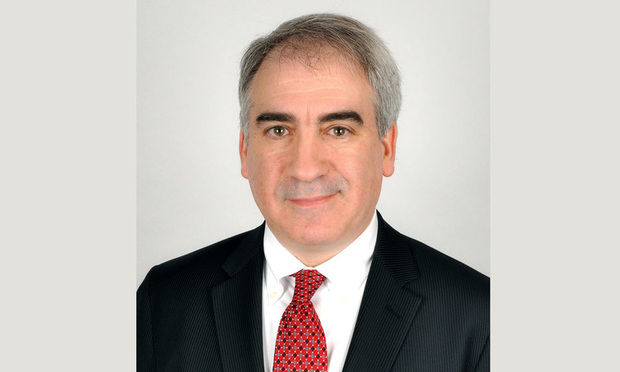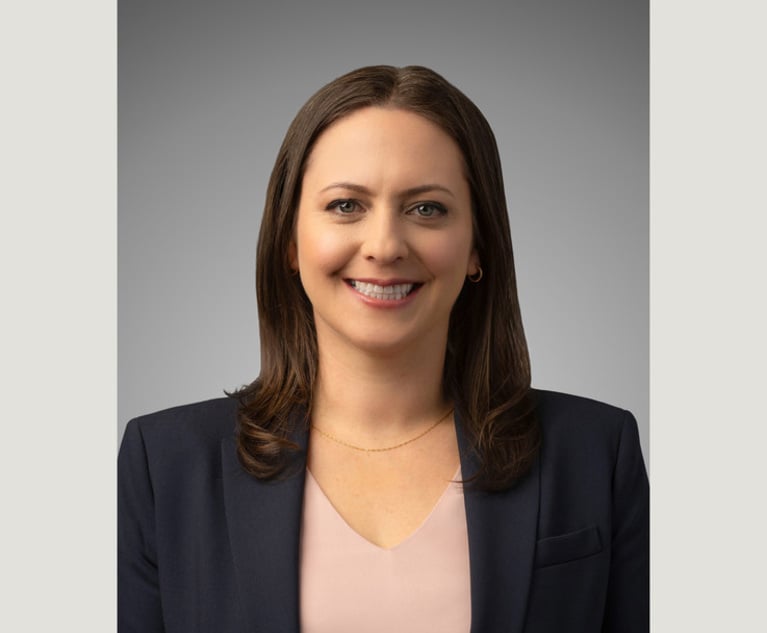Former SEC Senior Trial Counsel Arrives at Moses & Singer
A longtime SEC litigator who handled several high-profile cases, including against former Dewey & LeBoeuf executives, has moved to a midsize New York law firm.
March 28, 2019 at 05:49 PM
3 minute read
 Howard Fischer, the SEC attorney who prosecuted “The London Whale” and “The Big Short” cases, has joined Moses & Singer as a partner.
Howard Fischer, the SEC attorney who prosecuted “The London Whale” and “The Big Short” cases, has joined Moses & Singer as a partner.
Howard Fischer, who left his job Monday as senior trial counsel at the Securities and Exchange Commission, considered hanging up his spurs in 2014, when investment adviser Wing Chau broke down in tears while Fischer was questioning him on the stand. There's no way I'm topping this, he thought.
But Fischer stuck around until he heard about an opening at Moses & Singer, a New York firm with about 95 lawyers. He said that while many of his SEC colleagues took jobs in Big Law, he heard nothing but good things about the talent and reputation of attorneys at Moses & Singer, where he starts next week in its white-collar defense and securities litigation groups.
“Every single person I talked to pretty consistently told me the same two things,” he said. “The first was that they were terrific lawyers. The second was that they were terrific people.”
In his nine years at the SEC, Fischer worked on big and complex cases. The case of Chau, who was portrayed in the book and movie “The Big Short,” was emblematic: Chau and his company Harding Advisory, a collateral manager for the collateralized debt obligation named Octans 1, were accused of allowing the hedge fund Magnetar to recommend collateral that was not in the interests of the CDO's investors.
(Alex Lipman, the Brown Rudnick partner who represented Chau, said he remembers his client crying, an incident reported at the time by the press. Told Fischer was leaving the SEC, he laughed and said: “It's a good day for the United States of America.”)
New York lawyers may also know Fischer's work because he represented the SEC in its suit against former executives of Dewey & LeBoeuf. The defunct law firm's principals were charged with defrauding lenders and investors in the lead-up to its 2012 collapse. While the agency settled with the defendants for an aggregate total of about $216,000, a fraction of the alleged scope of the fraud, Fischer said the fact that the firm was already bankrupt sharply limited the possible recovery. (Dewey filed for bankruptcy in 2012.)
“In large amount, the relief [the SEC] can get is linked very significantly to the amount of the wrongful benefit that the defendants got,” he said. “We were able to prove up what we could and got what I thought was a good result.” If the firm itself was a defendant, he added, “a far larger sum would have likely been obtainable.”
Another one of the more prominent cases Fischer worked on was the SEC's prosecution of two men who worked with the so-called “London Whale,” JPMorgan Chase & Co. trader Bruno Iksil, who lost perhaps $2 billion for the bank. That case was ultimately dropped, which Fischer said was the right thing to do, partly because of issues with Iksil's testimony.
“Evidence mattered. Due process mattered. And if there were issues with the evidence … ultimately, you have to do what was right,” he said. “It wasn't just about getting scalps.”
At Moses & Singer, Fischer said he plans to help the firm work on government and internal investigations. The firm's practice groups in those areas are small, but very talented, he said.
Before working at the SEC, Fischer was a partner at the securities and finance litigation boutique Schindler, Cohen & Hochman.
This content has been archived. It is available through our partners, LexisNexis® and Bloomberg Law.
To view this content, please continue to their sites.
Not a Lexis Subscriber?
Subscribe Now
Not a Bloomberg Law Subscriber?
Subscribe Now
NOT FOR REPRINT
© 2025 ALM Global, LLC, All Rights Reserved. Request academic re-use from www.copyright.com. All other uses, submit a request to [email protected]. For more information visit Asset & Logo Licensing.
You Might Like
View All
Alston & Bird Adds M&A, Private Equity Team From McDermott in New York
4 minute read
Weil Lures DOJ Antitrust Lawyer, As Government Lateral Moves Pick Up Before Inauguration Day
5 minute read
Looking to the Future of the FDA and Its Impact on Drug Regulation in 2025
4 minute readTrending Stories
Who Got The Work
J. Brugh Lower of Gibbons has entered an appearance for industrial equipment supplier Devco Corporation in a pending trademark infringement lawsuit. The suit, accusing the defendant of selling knock-off Graco products, was filed Dec. 18 in New Jersey District Court by Rivkin Radler on behalf of Graco Inc. and Graco Minnesota. The case, assigned to U.S. District Judge Zahid N. Quraishi, is 3:24-cv-11294, Graco Inc. et al v. Devco Corporation.
Who Got The Work
Rebecca Maller-Stein and Kent A. Yalowitz of Arnold & Porter Kaye Scholer have entered their appearances for Hanaco Venture Capital and its executives, Lior Prosor and David Frankel, in a pending securities lawsuit. The action, filed on Dec. 24 in New York Southern District Court by Zell, Aron & Co. on behalf of Goldeneye Advisors, accuses the defendants of negligently and fraudulently managing the plaintiff's $1 million investment. The case, assigned to U.S. District Judge Vernon S. Broderick, is 1:24-cv-09918, Goldeneye Advisors, LLC v. Hanaco Venture Capital, Ltd. et al.
Who Got The Work
Attorneys from A&O Shearman has stepped in as defense counsel for Toronto-Dominion Bank and other defendants in a pending securities class action. The suit, filed Dec. 11 in New York Southern District Court by Bleichmar Fonti & Auld, accuses the defendants of concealing the bank's 'pervasive' deficiencies in regards to its compliance with the Bank Secrecy Act and the quality of its anti-money laundering controls. The case, assigned to U.S. District Judge Arun Subramanian, is 1:24-cv-09445, Gonzalez v. The Toronto-Dominion Bank et al.
Who Got The Work
Crown Castle International, a Pennsylvania company providing shared communications infrastructure, has turned to Luke D. Wolf of Gordon Rees Scully Mansukhani to fend off a pending breach-of-contract lawsuit. The court action, filed Nov. 25 in Michigan Eastern District Court by Hooper Hathaway PC on behalf of The Town Residences LLC, accuses Crown Castle of failing to transfer approximately $30,000 in utility payments from T-Mobile in breach of a roof-top lease and assignment agreement. The case, assigned to U.S. District Judge Susan K. Declercq, is 2:24-cv-13131, The Town Residences LLC v. T-Mobile US, Inc. et al.
Who Got The Work
Wilfred P. Coronato and Daniel M. Schwartz of McCarter & English have stepped in as defense counsel to Electrolux Home Products Inc. in a pending product liability lawsuit. The court action, filed Nov. 26 in New York Eastern District Court by Poulos Lopiccolo PC and Nagel Rice LLP on behalf of David Stern, alleges that the defendant's refrigerators’ drawers and shelving repeatedly break and fall apart within months after purchase. The case, assigned to U.S. District Judge Joan M. Azrack, is 2:24-cv-08204, Stern v. Electrolux Home Products, Inc.
Featured Firms
Law Offices of Gary Martin Hays & Associates, P.C.
(470) 294-1674
Law Offices of Mark E. Salomone
(857) 444-6468
Smith & Hassler
(713) 739-1250







